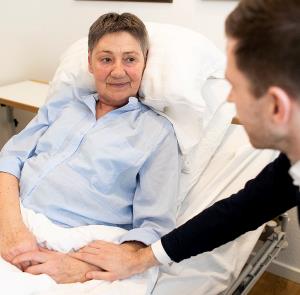Urinary tract infections are among the most common infections in the human body.
The urinary tract consists of the ureters, the bladder, and the urethra. The urinary tract is covered on the inside with a layer of mucous membrane. If this layer is inflamed, then we speak of a urinary tract infection.
A urinary tract infection is caused by bacteria and other pathogens, and can, in rare cases, be caused by viruses. The biggest culprit is the E. coli bacterium that is present in the intestines and penetrates the bladder from the anus through the urethra. The E.coli bacterium adheres to the bladder wall and causes inflammation.
Urinary tract infections in women
A urinary tract infection is more common in women than in men, because the female urethra is close to the vagina and anus. In addition, the urethra is also shorter than in men. Bacteria do not have to travel a long way, which makes it easier to reach the bladder in women.
Causes urinary tract infections in women
In women, other causes also play a role, such as sexual intercourse, pregnancy, changing hormones, incomplete emptying of the bladder, poor toilet hygiene (sweeping from the back to the front instead of from the front to the back). Also washing the intimate part with soap or detergent product with a too high pH value can cause an infection. The vagina has a value between 3.8-4.5. If you wash the intimate part with a washing product with a higher pH, the acidity changes. Bacteria (and fungi) thrive best at a higher pH. The use of medications such as antibiotics or corticosteroids, and a disease such as diabetes mellitus can disrupt the natural balance of the intimate part of the vagina and can cause urinary tract infection.
Urinary tract infections in the elderly
Urinary tract infections are very common in the elderly. The condition is often accompanied by abnormalities in the functioning of the urinary tract or abnormalities of the urinary tract itself. This is difficult to deal with.
Elderly people may experience cognitive changes if they carry an undetected urinary tract infection; especially if they live with dementia.
Be aware of signs such as a sudden urge to sleep more than normal, a reduced appetite or if the resident speaks differently and seems confused. It can also be difficulties recognizing normal everyday things, speaking incoherently or suddenly being afraid or fearful and experiencing delusions. These symptoms are signs of cystitis or other types of infections and can be the triggering factor.
Urinary tract infections in older women
The risk of urinary tract infection among women is also greatest in elderly people. During menopause women experience a decrease in estrogen. The mucous membrane of the vagina becomes thinner. In addition, less secretion is produced and the acidity changes. This makes women more susceptible to infections.
Cause cystitis
A womb prolapse can cause that the bladder cannot be emptied properly. A small amount of urine remains in the bladder, allowing bacteria to grow easily and thereby causing a bladder infection.
This also applies to older men with an enlarged prostate. They cannot empty the bladder well, which increases the risk of a urinary tract infection.
Older people in care institutions
Older people who live independently have less frequent urinary tract infection than older people who are nursed for physical or psychological reasons. In many countries, urinary tract infections are the most common infections in nursing homes.
Did you know? That UTI are the most common infections in nursing homes?
Source: https://www.ncbi.nlm.nih.gov/pmc/articles/PMC3526889/
Urinary tract infections and incontinence
Generally, people living with incontinence are more disposed to urinary tract infections. Because they cannot properly use or control the bladder muscles, the bladder is not completely emptied. As a result, urine remains in the bladder and bacteria can multiply more easily. People living with incontinence can be treated with a stay catheter. Catheterization is pre-eminently a means to promote the growth of bacteria. In addition, incontinence material is a source of bacteria, especially if there is fecal incontinence.
People with abnormalities in lower urinary tract
Deviations in the lower urinary tract can cause bladder inflammation. These (congenital abnormalities can be very diverse) people suffering from, for example, kidney stones have a very high chance of recurrent inflammations. A paralysis is another condition that can cause the risk of a urinary tract infection because the bladder often cannot be completely emptied. In some cases, a surgical procedure can be a solution.
Examples of urinary tract infections
Cystitis
An inflammation of the bladder is also called cystitis. Usually the course of a bladder infection is quite innocent. Symptoms may include: frequent urination or leakages, pain and burning sensation when urinating, cloudy and bad smelling urine, abdominal or lower back pain and sometimes blood in the urine. But, it is also possible that there are no symptoms, at all.
Kidney infection
Often a renal pelvic inflammation is caused by improperly treated bladder inflammation. In addition, it can be caused by (congenital) blockages in the urinary tract. Blockages can be caused by a swelling, kidney stones or an enlarged prostate. Kidney pelvic inflammation is much more severe than cystitis. Typical symptoms are fever, vomiting, pain when urinating, and pain under the ribs that can radiate to the genitals.




